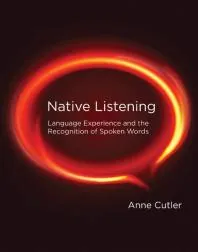Native Listening: Language Experience and the Recognition of Spoken Words
4.7
Reviews from our users

You Can Ask your questions from this book's AI after Login
Each download or ask from book AI costs 2 points. To earn more free points, please visit the Points Guide Page and complete some valuable actions.Introduction to Native Listening: Language Experience and the Recognition of Spoken Words
Language is central to human experience, and as listeners, the way we process spoken words is deeply shaped by the language we know. Native Listening: Language Experience and the Recognition of Spoken Words explores the intricate ways in which lifelong exposure to a native language molds our ability to understand spoken language effectively. By delving into the intersection of psychology, linguistics, and cognitive science, this book provides a rich and comprehensive examination of how listening is not just an auditory skill, but a learned, language-specific phenomenon.
This book sheds light on a fundamental truth: the human ability to seamlessly recognize and interpret spoken words is far from universal; it is instead the result of extensive experience with a native language. Detailed investigations of native listening pose profound implications for language learning, speech disorders, and technology-driven communication tools, urging readers to reconsider the processes at work during even the most ordinary conversation.
A Detailed Summary of the Book
The core argument in Native Listening revolves around how listeners of different native languages develop distinctive ways to process speech. In the book, I detail how factors such as vocabulary, phonology, and syntax shape listening strategies. Importantly, these listening strategies are not universal but rather tailored to the specific demands of one’s native tongue.
For example, a speaker of Japanese may not differentiate between certain speech sounds that are distinct in English, while an English listener might struggle to grasp tonal differences that are critical in Mandarin. How our individual linguistic backgrounds inform these differences is where the science becomes compelling. Through discussions of psycholinguistic experiments, studies on bilingualism, and practical applications like speech recognition technology, this book provides deep insights into how humans adapt to their language environment.
The book also does not shy away from the challenges listeners face when confronted with unfamiliar languages. I address how native listening strategies can hinder perception when dealing with non-native accents or entirely new languages. This discussion opens a broader perspective on what it means to learn a language and emphasizes how one’s linguistic past influences future learning.
Key Takeaways
- Native listening is not a universal construct; it is language-specific and shaped by our linguistic experiences from infancy onwards.
- Listeners process spoken words by combining sensory input with expectancies derived from the structure and sound patterns of their native language.
- The same linguistic features that facilitate native listening may impede accurate recognition of speech in unfamiliar languages or accents.
- Speech comprehension, even in everyday conversation, is a sophisticated interplay between auditory perception and cognitive processes shaped by years of language exposure.
- Understanding native listening can provide insights into language learning, the design of speech recognition technologies, and diagnosis of language-related disorders.
Famous Quotes from the Book
"Our experience with our native language tunes every aspect of how we perceive and understand speech."
"Listening does not begin and end with hearing; it is an act of recognition shaped by years of language-specific knowledge."
"The beauty of spoken language lies in its fluidity and its adaptability, yet this fluidity is channeled through the rigid framework of our linguistic experience."
Why This Book Matters
In an increasingly globalized world, understanding how people listen to and interpret spoken language is more relevant than ever. This book bridges the gap between academic theory and real-world applications, making it a must-read for linguists, psychologists, educators, and technology developers alike.
The book challenges traditional views that treat listening as a neutral, passive process. It not only showcases the incredible adaptability of human cognition but also underscores the importance of appreciating language diversity. For educators, the book offers crucial insights into the challenges faced by language learners; for technologists, it emphasizes the need to design speech systems that account for varied linguistic backgrounds.
Ultimately, Native Listening illuminates the profound, often unseen, ways that language shapes how we hear and understand the world around us. By focusing on the role of lifelong language experience, the book contributes meaningfully to broader discussions on how we communicate as human beings, making it a vital resource for anyone interested in the science of language and cognition.
Free Direct Download
You Can Download this book after Login
Accessing books through legal platforms and public libraries not only supports the rights of authors and publishers but also contributes to the sustainability of reading culture. Before downloading, please take a moment to consider these options.
Find this book on other platforms:
WorldCat helps you find books in libraries worldwide.
See ratings, reviews, and discussions on Goodreads.
Find and buy rare or used books on AbeBooks.


